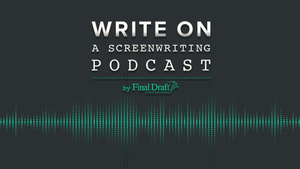
Write On: A Screenwriting Podcast
Final Draft
Interviews with screenwriters, producers and more
- 32 minutes 7 secondsWrite On: 'Conclave' Screenwriter Peter Straughan
“If everything's being played on the surface, it's very hard to make that character come to life. You want hinterland, you want subtext. You want the things that are buried, the things that we don't know about them, the things that maybe they don't know about themselves. And always, the story is about this excavation of what's underneath the surface. One way or the other, that's kind of what story is. It's about bringing things to the surface,” says Conclave screenwriter Peter Straughan, about the importance of giving your characters secrets.
In this episode, we speak to Peter Straughan about his powerful film Conclave, starring Ralph Fiennes, Stanley Tucci and John Lithgow. Based on the book by Robert Harris, the movie follows five very different modern Catholic Cardinals as they go through the process of electing a new Pope. Straughan talks about why he loves a flawed hero, getting to tour the Vatican, what surprised him the most, and whether or not he thinks the real Pope will watch this movie.
Having also written the TV show Wolf Hall about Tudor England, Straughan also talks about the surprising connection between King Henry VIII and the modern Catholic Church.
“Both the world of the Tudors and the world of Conclave give us a way of looking at human behavior and the pursuit of power from a sort of angle that makes it particularly clear and fresh, without the clutter of the normal secular world of elections, that really anchors it in the human individual. So, Tudor England was maybe the last time where the sexual desires of one man was going to dominate the political landscape of an entire country. Maybe not the last time. Maybe this still happens in the world. But it becomes really pared down to basics, so you see very clearly what's going on. And I think it feels the same with Conclave, it's about the personalities and the morals of these few individuals,” says Straughan.
Just a warning, there are spoilers about the ending of Conclave in this episode, but we give you plenty of warning before they are discussed.
To hear more about Straughan’s writing process, listen to the podcast.
6 January 2025, 4:17 pm - 40 minutes 7 secondsWrite On: 'Only Murders In The Building' Co-Creator & Showrunner John Hoffman
“There's no greater laugh than when you're at your most vulnerable. You're at a funeral, or you're in church and something's happening and there's great reprieve from the most human moments through humor. And even in those moments, something is funny or human and fumbling. And that scene itself [when Charles discovers Sazz’s ashes], when I was watching it, I really felt like this scene is encapsulating the whole experience of the best of this show for me when he is standing there and then watching him wipe her ashes off and he’s in deep pain over it, but caring so much. And then she pops in the doorway. I don't know, things like that just made me happy to have been able to do anything like that,” says John Hoffman, co-creator and showrunner for Only Murders in the Building, about balancing the humor and the grief in the show.
In this episode, we go deep into Season 4 of Only Murders in the Building with co-creator, showrunner and writer/director John Hoffman. He talks about writing from theme, shares details about that rip-roaring fight scene between Meryl Streep and Melissa McCarthy, and exploring visual motifs this season.
“The twins and the reflections made me think of so many of my favorite films and the way cinema is used to show reflections and to do parallels and the Bergman-esque stuff. And I mean, granted, none of that might relate to what you're watching on this show. But playing off that theme felt really good. We are a show that's about three isolated, very lonely people in New York City and finding connection and so I think that recognition of we're more alike than we're apart also plays a huge part in the telling of the stories of Season 4. I like organizing them that way,” he says.
Hoffman also shares his advice for writing great scenes: “Know what a scene is and know that a scene wants to move in a certain way, and flip in a certain way. It might not take you in the direction you thought it was going to, but sometimes it will give you something of great comfort. Check yourself over and over again… is it honest? And check yourself on the truth of a character's motivation. Would a human being do that, ever? And if not, what could compel them to do it? There are all those things that are just very basic to me,” he says.
To learn more about Hoffman’s writing process, listen to the podcast.
Please note: this episode contains mention of suicide.
3 January 2025, 4:28 pm - 35 minutes 30 secondsWrite On: 'Dune: Part One & Part Two' Screenwriter Jon Spaihts
“In most genre fiction where heroes and villains clash, the hero is intrinsically reactive. The villain starts making trouble and that’s the beginning of the story. If the villain had never showed up, the hero would have lived a pleasant and unremarkable life and had a lovely time. And nothing novel-worthy would have popped up. But the villain comes along and does something terrible and that makes heroic action necessary. So if that’s the function of the hero in the story, to be called to heroic action, then the first conflict that’s readily available to you is reluctance or a sense of being unworthy… and then after that, the hero will be called to take on a new shape and often that will be in response to the shape of the danger, in response to the shape of the wickedness a foot,” says Oscar-nominated screenwriter, Jon Spaihts, about the classic hero-villain relationship in Dune: Part One and Dune: Part Two, based on the books by Frank Herbert.
In this episode, Jon Spaihts talks about the importance of hand-to-hand combat in mythic storytelling, his favorite scene in Dune 2, and we do a deep dive into his most adored character, Lady Jessica, played by Rebecca Ferguson. We explore the nature of her mystical powers and why she’s so feared by the men in the story.
Spaihts also shares his advice about what it really means to get personal with your writing.
“When people say to make your story personal, they don’t really mean look at yourself. You are the least qualified person to say something meaningful about yourself. What people are really talking about is that you should focus on the things that obsess you. You can look at the things that are most plangent to your feelings, that are most itchy and sticky for your intellect, the things you can’t stop thinking about. You can focus on the experiences that have impacted you most profoundly. Those things – the things that push on you and pull on you – that is personal storytelling. You look not at yourself, you look at the things that have moved you, that have affected you, that have changed you, redirected your life and the things that preoccupy you. Those are your seeds of personal storytelling,” says Spaihts.
To hear more about writing Dune 1 and 2, listen to the podcast.
30 December 2024, 5:02 pm - 37 minutes 13 secondsWrite On: 'Nosferatu' Writer/Director Robert Eggers
“As someone who’s been obsessed with vampires since I was a little kid, I don’t totally know [why we love vampire movies so much]. Obviously, sex and death are always interesting and in vampire stories, including the very earliest accounts of folk vampirism in Eastern Europe, that connection has always been there. Some of these early folkloric vampires didn’t drink blood but fornicated with their widows until they died. And then, being undead, rising from the grave, you know Dracula and Jesus have had the most movies made about them of any popular characters in Western cultures, so there must be something to that as well,” says Robert Eggers, writer/director of Nosferatu, starring Lily Rose Depp, Nicholas Hoult and Bill Skarsgård.
In this episode, Eggers talks about the play-version of Nosferatu that he wrote and directed when he was in high school, writing the Ellen character (Depp) as a woman at war with herself, and making Orlok (Skarsgård) the villain without making him too arch or campy.
“[Orlok] has a sense of humor and he has a sense of poetry. He’s a well-learned man so that’s enjoyable. It’s fun to write dialogue for someone who had their heyday in the the 16th century and English was like their 17th language, that’s fun,” says Eggers.
We also asked Eggers about telling an old story but making it relevant to today. He says that while he doesn’t worry about making a film with a specific message, “I don’t live in a vacuum. So even if I’m not trying to write a film with a message, whatever is happening around me is coming out. Also, it’s interesting that the movie didn’t get made until when it did. The original Nosferatu came out a couple of years after the Spanish flu. This is coming out a couple of years after the pandemic. And I wrote all that stuff before the pandemic. In fact, they had face coverings originally, and I took them away because it felt too much on the nose. So, I think it’s all there for the taking,” he says.
To hear more about the power of vampires and Egger’s writing process, listen to the podcast.
27 December 2024, 4:13 pm - 36 minutes 59 secondsWrite On: 'Deadpool & Wolverine' Co-Writer & Director Shawn Levy
“I would argue that the movies, the plays, the stories that endure and certainly that resonate in the most populist and global way are the ones where we’re not just observing a piece of storytelling, we’re participative in some way and it’s connective. How can any of us who are flawed humans connect with a flawless hero? The beauty of Wade [Deadpool] and Logan [Wolverine] is that really, they’re two anti-heroes. They do not abide by typical moral codes. They both have been scarred deeply. And I think one thing that’s really interesting about them is that the worst thing that’s ever happened to them is also the source of their superpowers. Which I think, by the way, is something worth thinking about in all our lives – that the things that we had to get over are also the source of our strength,” says writer/director of Deadpool & Wolverine Shawn Levy.
In this episode, we discuss the elements that Levy thinks make a great hero and also a powerful villain like Cassandra Nova (Emma Corrin).
“There was something really juicy about [Cassandra’s] twinship with Charles Xavier, that this villain is a new villain who has never been in a movie, who has never been anywhere other than the pages of a Marvel comic book. But there is this connective tissue to deep beloved, extensive mythology with Professor X and Charles. So we did lean into her resentment, her envy of Charles. You know, I think maybe one of my favorite couplets of our writing in this movie is when Cassandra says to Wolverine, ‘He must have really loved you.’ And he says to Cassandra, ‘He would have loved you too. He would have torn a hole in the universe if he knew where you were.’ I get goosebumps saying it now!” says Levy.
We also break down that hilarious fight scene between Deadpool & Wolverine that takes place entirely inside a Honda Odyssey.
To hear more insights about the highest grossing R-rated comedy of all time, listen to the podcast.
18 December 2024, 4:35 pm - 30 minutes 53 secondsWrite On: 'Nickel Boys' Writer & Director RaMell Ross
On today’s episode of the Write On podcast, we speak with RaMell Ross about his new film Nickel Boys about two young Black men who get sent to a reform school in 1960s Jim Crow South. The film is heartbreakingly beautiful and already getting plenty of Oscar buzz.
In the interview, Ross admits he didn’t know how to write a screenplay when he decided to adapt Colson Whitehead’s book Nickel Boys, so he began the process by using written storyboards to visualize the scenes, which were later converted into a screenplay with the help of co-writer Joselyn Barnes.
We also discuss his decision to limit the violence depicted on screen. “It’s a tough space because on one hand, you want people to understand the things that happened and their horror. But I feel as a culture, we’ve been overexposed to it and specifically overexposed as it relates to people of color because we don’t have so many iterations of visuals of people of color. If that’s most of it, then how does that work on the culture and psyche?” says Ross.
Ross also shares his take on writing a movie with historical elements. “I don’t think that what we understand to be history is history. I think that it’s a collection of familiar ways of analyzing or engaging with the past that fits comfortably in the socio-political language of reflection. I don’t know what it’s like to be a person in the past. And I know that a lot of the narratives that we have these days are guided by a person’s either nefarious unconscious or they have another type of motivation behind them. And so I want people to think about the past as something that has the freedom of interpretation, that we would like to be given to all of the things that we’ve done in our lives. I just don’t believe in historical reproduction,” he says.
Listen to the podcast to find out more about Ross’s filmmaking process.
13 December 2024, 4:54 pm - 34 minutes 23 secondsWrite On: 'The Bikeriders' Writer & Director Jeff Nichols
“You’re reading these interviews [in the book The Bikeriders by Danny Lyon] and they’re all interesting, but Kathy’s are just fascinating. You could just tell she was a character, meaning she was just this interesting, dynamic person, a person that was trying to figure out how she found herself in this world because she really talks about walking into this bar and meeting this charismatic young bike rider. And so, it was a really beneficial crutch for me to kind of get into this world. And then before you know it, by the middle of the script, I’m writing words for Kathy that never existed. It didn’t hurt that, in my research, I reached out to Danny and he turned over hours and hours of recordings. I would drive around town just listening to Kathy talk. I mean, I had this woman in my head and I felt pretty confident midway through the script that I could write in her voice. It just gave this perspective to a very masculine, aggressive subculture. It gave this feminine point of view, but to me it was just a really interesting point of view,” says writer/director Jeff Nichols about writing the character Kathy, played by Jodie Comer, in his film The Bikeriders.
In this episode of the podcast, we speak to Jeff Nichols about his departure from Southern Gothic storytelling and going deep into the world of a 1960s motorcycle club for The Bikeriders, starring Austin Butler and Tom Hardy. We also discuss some of his other films like Loving, Take Shelter and Mud, starring Matthew McConaughey – a film Nichols thought would never get released.
“I thought Mud was a failure. We had taken Mud to the Cannes Film Festival, and although we had a really nice reception there, you know, standing ovations and whatnot – no one bought the film. And we went an entire year with no one buying that film. In fact, no one ever did buy that film. The financier put up half the money to market and distribute that film and luckily, Roadside Attractions came in and put up the other half and then it became the film that everybody knows,” says Nichols.
To hear more about Nichols’s writing process, and his advice for building stories around “emotional impact,” listen to the podcast.
11 December 2024, 4:42 pm - 31 minutes 22 secondsWrite On: 'The Order' Writer Zach Baylin
“I find action scenes really hard to write, I usually save them for the end. I need to get very caffeinated and then just try and get into the adrenaline of what they should feel like. With this [film] in particular, those robberies and the heist… I kind of like to really understand an environment and a landscape before I can write an action sequence. Because if I can’t figure out when a car is overtaking another car or where characters are in relation to it, then it’s impossible to write dialogue. I really try and map out the choreography of things and when to have those spikes of violence. I think you just feel it. You feel it on the page where hopefully you’ve built the tension. There needs to be some kind of release. And that’s maybe a gunshot or maybe it’s a line of dialogue that pulls someone in another direction. I’m pretty prescriptive in the way I write action and I write it in the way I hope it will be shot and it’s not just like an overview of a scene,” says screenwriter Zach Baylin on writing action sequences in his new film, The Order.
The Order stars Jude Law and Nicholas Hoult and tells the true story of an FBI agent (Law), who’s determined to bring down a group of domestic terrorists in the Pacific Northwest in the 1980s.
In this episode of the podcast, we talk with Zach Baylin about writing action sequences and also his film King Richard, for which he was nominated for an Academy Award. He also shares this advice for writing a period film that might have parallels to today’s society:
“In terms of keeping things entertaining and not wanting to be preachy and didactic, I think that the approach that I took was just to try and tell the story of what happened in 1983 and ‘84 accurately and not to over relate it to today. The parallels to today are so obvious that if we were to throw in lines about things that felt like they were alluding to the present, it would totally take out both the veracity and the intention, which was, I want to tell this story correctly. And if I do, then you’ll walk out of it, both having been entertained and informed,” says Baylin.
The Order is in theaters now. To hear more about Baylin’s writing process, listen to the podcast.
6 December 2024, 5:02 pm - 44 minutes 24 secondsWrite On: TV Writing with Laura Eason
“About 12 years ago, I had my very first meeting to staff. It was a show being run by a playwright named Beau Willimon, and he'd done one season of a show that hadn't dropped yet, and they were going to do this crazy new model where the whole season was going to drop at once and they didn't know how it was going to go. And that was a show called House of Cards. And I was staffed for season two of that show before season one dropped. So, that was my entrance into television. It was my first meeting to staff on any show!” says Laura Eason, playwright and current showrunner for Starz’s TV show Three Women.
In this episode of the Write On podcast, we chat with Laura Eason about her illustrious career as a playwright and how she made the intimidating transition to TV writing.
“I got a call a week before the [House of Cards] room started and I went to Barnes and Noble and bought the book How to Write the One Hour Drama. I'm not kidding. I was like, oh my God. And I called everyone I knew that had been in TV and said, ‘Tell me everything you can about being in a room and how it's supposed to go.’ And then I was very lucky my first year in TV,” says Eason, who was nominated for an Emmy for House of Cards in 2017.
Eason also talks about her latest show Three Women, its unique structure, and also shares her advice for writing a TV pilot as the tides in Hollywood are changing.
“Well, we're coming into a different moment with this contraction that we're having in the [TV] industry. We had a very beautiful time where I think there was a lot of room for idiosyncrasy, and a lot of room for things to not quite check the list of everything a pilot should probably be, but because the voice was really unique or the world was interesting, those shows still got made. And I think we're in a moment now where all of the fundamentals need to be really, really strong. Like the engine of your pilot really needs to work. Someone needs to read that pilot and understand how you're going to be able to make 10 episodes or 20 or 50 episodes of that show, especially because there's less interest in limited series. So, making sure that you're paying as much attention to engine, to character, to your act structure, that the action is really moving and the acts the way it should as much as your voice, the unique things you bring, because of course that's the special sauce. But you really need to have both now, in a really strong way."
To hear more, listen to the podcast.
25 November 2024, 4:38 pm - 48 minutes 28 secondsWrite On: 'Colin From Accounts' Co-Creators Patrick Brammall & Harriet Dyer
“We never wanted to make a show about dogs. We wanted to make a show about people. And then secondary to that, people who love dogs. We made sure we had some of Colin [the dog, in season two], like there’s that lovely episode in seven where Gordon becomes a stage mum to a TV dog, which is so funny. But yeah, we just wanted it to be interesting,” says Harriet Dyer, co-creator and star of Colin From Accounts about the shift away from Colin the dog to focus more on the relationship between Ashley and Gordon, and develop the supporting characters.
In this episode of the Write On podcast, we check in with the real-life Australian married couple Patrick Brammall and Harriet Dyer now that season two of Colin From Accounts is out on Paramount+. Brammall and Dyer talk about balancing the tone of the show that continues to have a few scatological elements and misbehaving body parts, but keeps the characters grounded as Gordon deals with a loss. “Episode five is a bit of a departure from the structure of the show and mixes the light and the dark with the comedy butting right up against the tragedy. We played a bit more with that as well. We did stuff that interested us and made us laugh,” says Dyer.
Brammall also shares his advice for taking control of your creative life. “I started writing plays with a friend of mine because you have no agency as an actor. You’re waiting for the phone to ring. You’re waiting for someone to give you work. You can’t create your own work. And I’m like, well, f*ck this. I want to create work. But you definitely need a big old f*cking dose of luck on the way… And now more than ever, there are ways to make your own stuff and get it out there and produce it. But of course, the flip of that is that there is way more people doing that as well. How does one stand out? I don’t know. All I would say is it’s not going to happen if you don’t start doing it!”
To find out more about Brammall and Dyer’s writing process, listen to the podcast.
21 November 2024, 4:39 pm - 31 minutes 22 secondsWrite On: 'A Real Pain' Writer/Director Jesse Eisenberg
“What I wanted to do with this movie was take this interesting relationship that I have been exploring over the course of my writing, over 20 years, and this dynamic, and set it against the backdrop of something so objectively worse than anything the characters are going through. I wanted to put this funny, fraught relationship that seems like the stakes are quite high – are these two people going to continue on together? Against the backdrop of stakes that are so much higher, we can put their relationship into perspective,” says Jesse Eisenberg, writer/director and star of the new buddy movie A Real Pain that takes place on a holocaust tour of Poland.
In this episode of the Write On podcast, Eisenberg talks about spending years trying to get this particular story just right, how it was personal to him, what it was like to shoot at a concentration camp and the great advice his producer Emma Stone gave him. He also shares his criteria for writing a road trip/buddy movie.
“It has to have an original quality to justify it as a movie. I read so many scripts as an actor and I’ve written so many things, that [a script] has to have two things: it has to be specific enough to feel real and personal. There are just so many movies in this road trip/buddy movie genre, if it doesn’t feel specific I think an audience can sniff it out immediately. The other thing is to make it feel new, to have a new reason to tell this story so it doesn’t feel like something I’ve seen 10,000 other times,” says Eisenberg.
Listen to the podcast to learn more.
15 November 2024, 3:35 pm - More Episodes? Get the App
Your feedback is valuable to us. Should you encounter any bugs, glitches, lack of functionality or other problems, please email us on [email protected] or join Moon.FM Telegram Group where you can talk directly to the dev team who are happy to answer any queries.
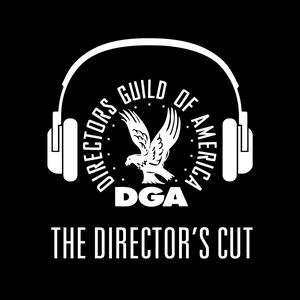 The Director's Cut - A DGA Podcast
The Director's Cut - A DGA Podcast
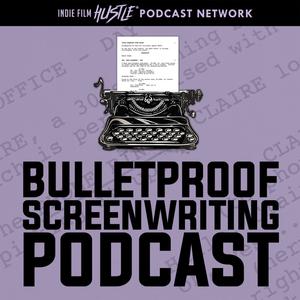 Bulletproof Screenwriting™ Podcast
Bulletproof Screenwriting™ Podcast
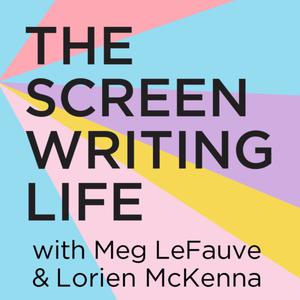 The Screenwriting Life with Meg LeFauve and Lorien McKenna
The Screenwriting Life with Meg LeFauve and Lorien McKenna
 Script Apart with Al Horner
Script Apart with Al Horner
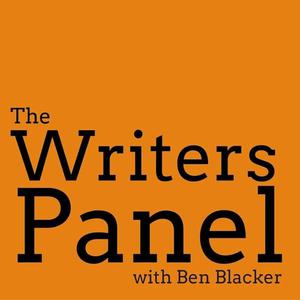 The Writers Panel
The Writers Panel
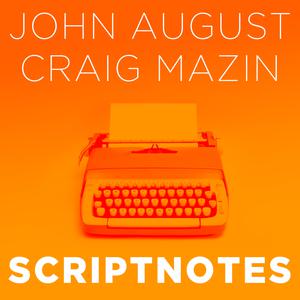 Scriptnotes Podcast
Scriptnotes Podcast